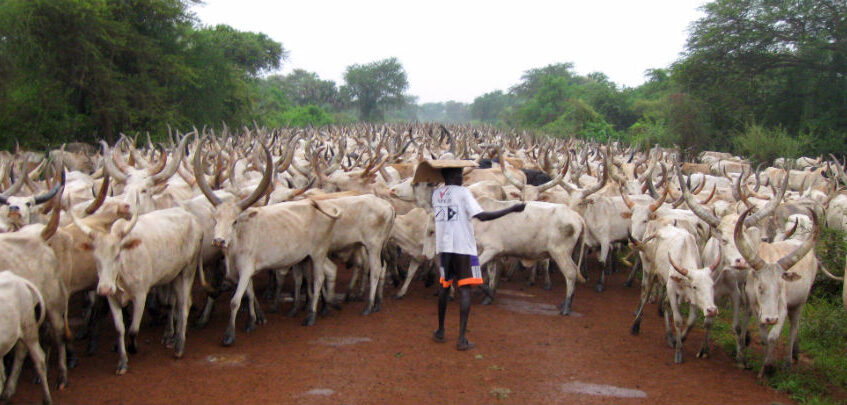
A herd of cows on the road to Bor, South Sudan. (Photo: BBC World Service)
A senior government official on Tuesday decried South Sudan’s imports dependence, saying the country still brings in livestock and fish products from the region despite being gifted with abundance resources including millions of cattle and large fishery.
Onyotti Adigo Nyikwec said millions of people arw impoverished although the country is endowed with the vast natural wealth of agricultural resources.
According to reports, South Sudan has about 36 million heads of cattle, goats, sheep, and abundant fishery resources.
African Development Bank says livestock can contribute about 36% in agricultural Gross Domestic Product and provides livelihood to about 80% of the country’s population.
But Minister Adigo said South Sudanese continues to be food-insecure and children are malnourished.
“Millions of South Sudanese continue to be food insecure and children are malnourished amid plenty of agricultural resources,” Adigo said.
“The country losses huge amount of foreign currency every year as a result of importing food items including livestock fishery products to meet the demand of the rapidly growing urban population.”
He made the remarks on Tuesday as Food and Agriculture Organization (FAO) and the government celebrated South Sudan’s tenth-year membership in the UN agency.
He further said South Sudan has huge agricultural resources” which must be exploited especially in the context of livestock and fisheries sector.”
South Sudan’s livestock sector is said to have the potential to address the challenges of nutrition, food insecurity, and poverty that continues to have a negative impact on the country’s socioeconomic situation.
However, it is handicapped with constraints including insecurity, climate change, and low public and private sector investment in livestock and fisheries.
Low yield and productivity as well as disease burden and local market insufficiency reduce the competitiveness of livestock production.
The event also witnessed the signing of the country’s program framework between the UN food agency, FAO with the Ministry of Agriculture and Food Security and the Minister of Livestock and Fisheries.
The 27th-page document provides guidance on the relationship between the institutions in executing the activities.
On May, 2022, the government issued an order for the regulation and management of all livestock, fish and their products.
Minister Adigo said the purpose of the ministerial order is to control and combat livestock and fish diseases, protect public health and curb smuggling.
In the order, importers and exporters of livestock and fish, and their products are required to obtain several permits and certificates, including a letter of no objection from the ministry in order to process their work licenses.
Support Eye Radio, the first independent radio broadcaster of news, information & entertainment in South Sudan.
Make a monthly or a one off contribution.
Copyright 2024. All rights reserved. Eye Radio is a product of Eye Media Limited.